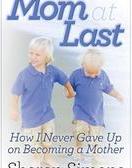Times have changed and more and more women are putting off having children for the sake of furthering their careers or pursuing a higher education. While this can do wonders for you vocation and pursuit of knowledge, it can potentially have some adverse effects for women who still plan on becoming pregnant. With the increase of women using assisted pregnancy methods (some 160,000 last year alone) the practice of in vitro fertilization (IVF) is quickly becoming a household name. With this emerging popularity it can be easy to lend it a little more success than what it can actually provide.

The truth of the matter is that it makes no difference how youthful you feel; regardless of how low that marathon time is or how active you are in your city’s crossfit community, your body still develops like any other woman. In a recent study of 6,000 women over the course of five years, IVF was shown to offer no concrete evidence of being able to change that.
Findings from the study concluded that a woman’s age is still the largest contributing factor when a looking to become pregnant. Research shows that women who fall under the age of 35 had the highest fertility rates. It was in women who were 35 and up that the rate of successful pregnancies began to dwindle.
The Demographic
In vitro fertilization cycles occurr about ten percent of the time in women who were 40 or older. The rest of the cycles genrally take place in women who are under the age of 40. For those ten percent of women who did elect for IVF, the success rate for pregnancy was noted at being extremely low. While doctors do say that each woman operates on an individual level, the study found that only 12% of women who were between 40 and 42 walked away from their IVF cycles with a successful pregnancy. For women over the age of 42 this number decreased even further to only a 4% success rate.
These numbers came in stark contrast to women under the age of 40. For women who were between 38 and 40 the success rate jumped to 22%. Subsequently, these numbers grew even higher for women in the age range of 35-37; this demographic saw a 32% success rate. The remaining age groups sat at about a 42% success rate with higher pregnancy rates being noted for women who were younger.
Multiple Embryos
What becomes interesting to note is that even though these numbers are still low for women over the age of 40, the success rate can increase as the number of eggs retrieved from the donor goes up. While the above information states the success rate as being fairly low for women over the age of 40, these numbers reflected IVF procedures with one to two eggs implanted. When 10 or more eggs were involved the success rate jumped up quite significantly with a 2008 study noting a 35% pregnancy rate.
While this can be an appealing number it’s important to note the many complications that can arise from women who elect to have multiple eggs used for one cycle. While the exact numbers are hard to come by, pregnancies as a result of an IVF procedure have a 20% higher chance of resulting in multiple births. Other complications can arise when a multiple birth occurs as well such as gestational diabetes and pre-term labor.
A Growth in Numbers
With all the statistics pointing towards younger being better, this still hasn’t stopped or dissuaded some women who are over the age of 40 from electing for an IVF procedure. One US study released showed that IVF cycles in women over 40 had grown nearly three times as women in any other age range.
This burst in growth shows a curious thing. With IVF cycles costing upwards of $25,000, they can be a potentially spendy ordeal. Even though the numbers and statistics are not in the older woman’s favor, it appears that it has not stopped these couples from trying. The readiness to devote thousands of dollars to bear a child through IVF technologies demonstrates that there is an inherent need that subsists to produce a child of one’s own.
About the Author
Cynthia Dorsch loves writing about health and wellness. In her free time she can often be found researching and catching up on trending techniques and new innovations in the medical field. She currently writes and blogs for My Egg Bank, a company specializing in assisted reproductive technologies.
Image courtesy of [Ambro] / FreeDigitalPhotos.net

